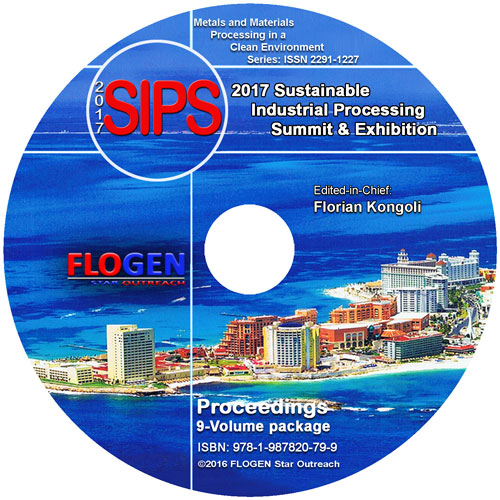2017-Sustainable Industrial Processing Summit
SIPS 2017 Volume 7. Recycling, Secondary Batteries and Environmental Protection
| Editors: | Kongoli F, Aifantis K, Kumar V, Pagnanelli F, Kozlov P, Xueyi G |
| Publisher: | Flogen Star OUTREACH |
| Publication date: | 19 December 2017 |
| Pages: | 205 pages |
| ISBN: | 978-1-987820-73-7 |
| ISSN: | 2291-1227 (Metals and Materials Processing in a Clean Environment Series) |

CD shopping page
Transforming Potential in Reality: The Case of Brazilian Macaw Palm
Flavio Aristone1;1UFMS, Campo Grande, MS - Brazil, Brazil;
Type of Paper: Regular
Id Paper: 232
Topic: 10
Abstract:
Brazilian macaw palm is a typical abundant tree spread almost all over South America. Theirs fruits are a sort of small coco much appreciated particularly by kids, as its pulp is sweet and pleasant to chew. Even the amount of the natural production for this palm tree is quite impressive. These fruits can be entirely used for the noblest purposes, which are the manufacture of human food products. The pulp of macaw palm fruits are plenty of Vitamin A precursor and the inside nut has Omegas 3 and 6 oils. Both palm tree and fruit are locally named as �bocaiuva� and despite all scientific already proved knowledge, the usage of these palm trees was dramatically dropping in the past. In order to recover a cultural behavior, we started a project back in 2004 devoted to visiting small isolated communities in the Brazilian Pantanal wetland region, and teaching people how to prepare a dehydrated product from the pulp of these fruits that is similar to a regular flour. The responses received at that time exceeded our expectations, and we decided to carry on new similar projects. Today, there are concrete results to be mentioned: a few industries to process �bocaiuva� are already installed in the country and new ones are in process. The bocaiuva subject is currently largely explored at many universities and research centers. New potential applications are being constantly discovered in the area of food processing and products, cosmetics, animal feeding, and even pharmaceutical products. All these processes started from a complete sustainable project that aimed to rescue a vanishing cultural behavior, that would at the same time give opportunity for those involved to generated earnings simply by respecting the environment, as the bocaiuva fruits were to be collected in total balance with nature. These origins naturally required that the new companies arriving to commercially explore the macaw palm have a framework of environment protection at the very beginning, making the projects more environmentally friendly. Large areas of macaw palm are being planned, and some are already installed or in process of implementation, all in the state-of-art concept of crops consortium.